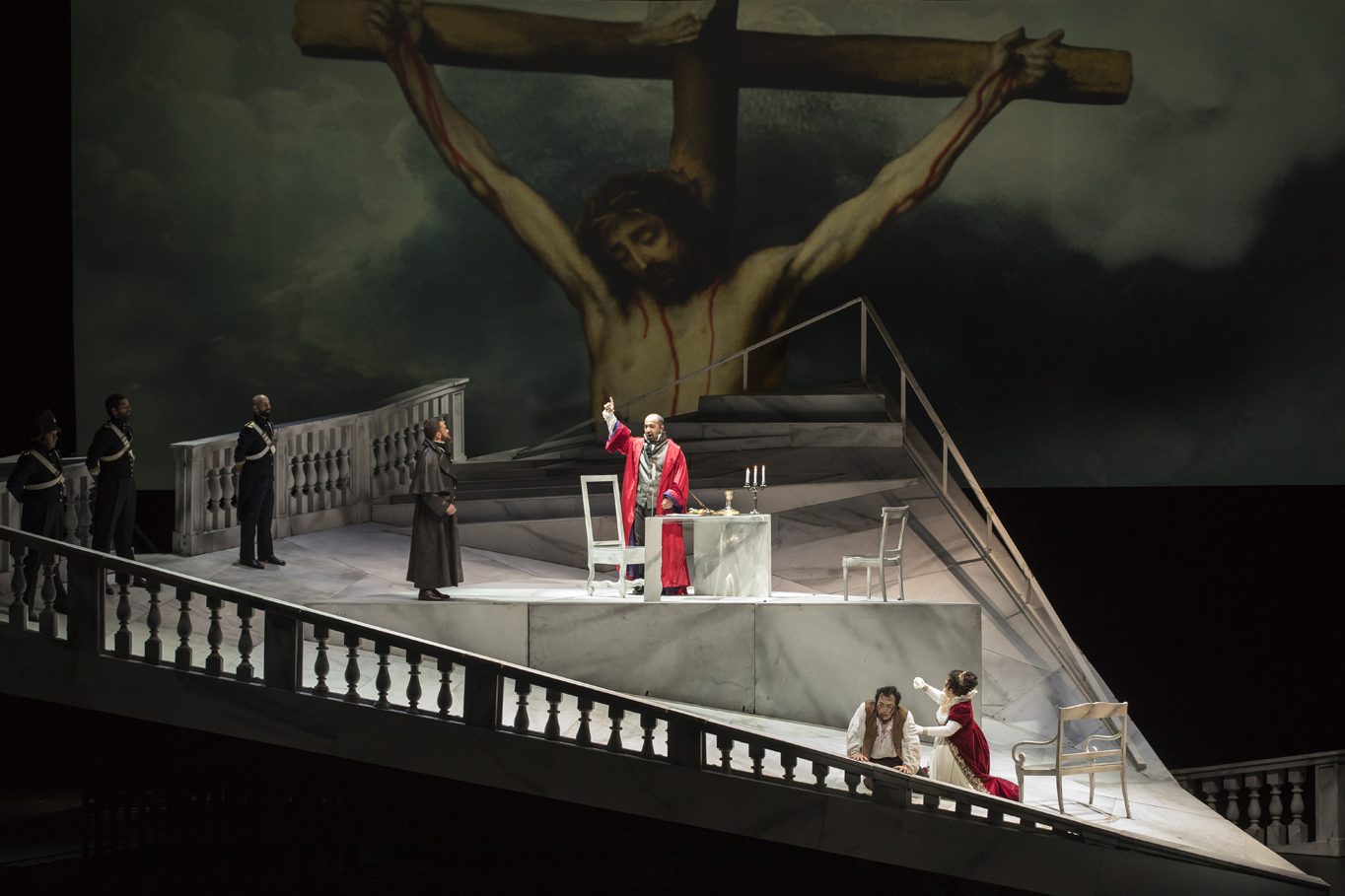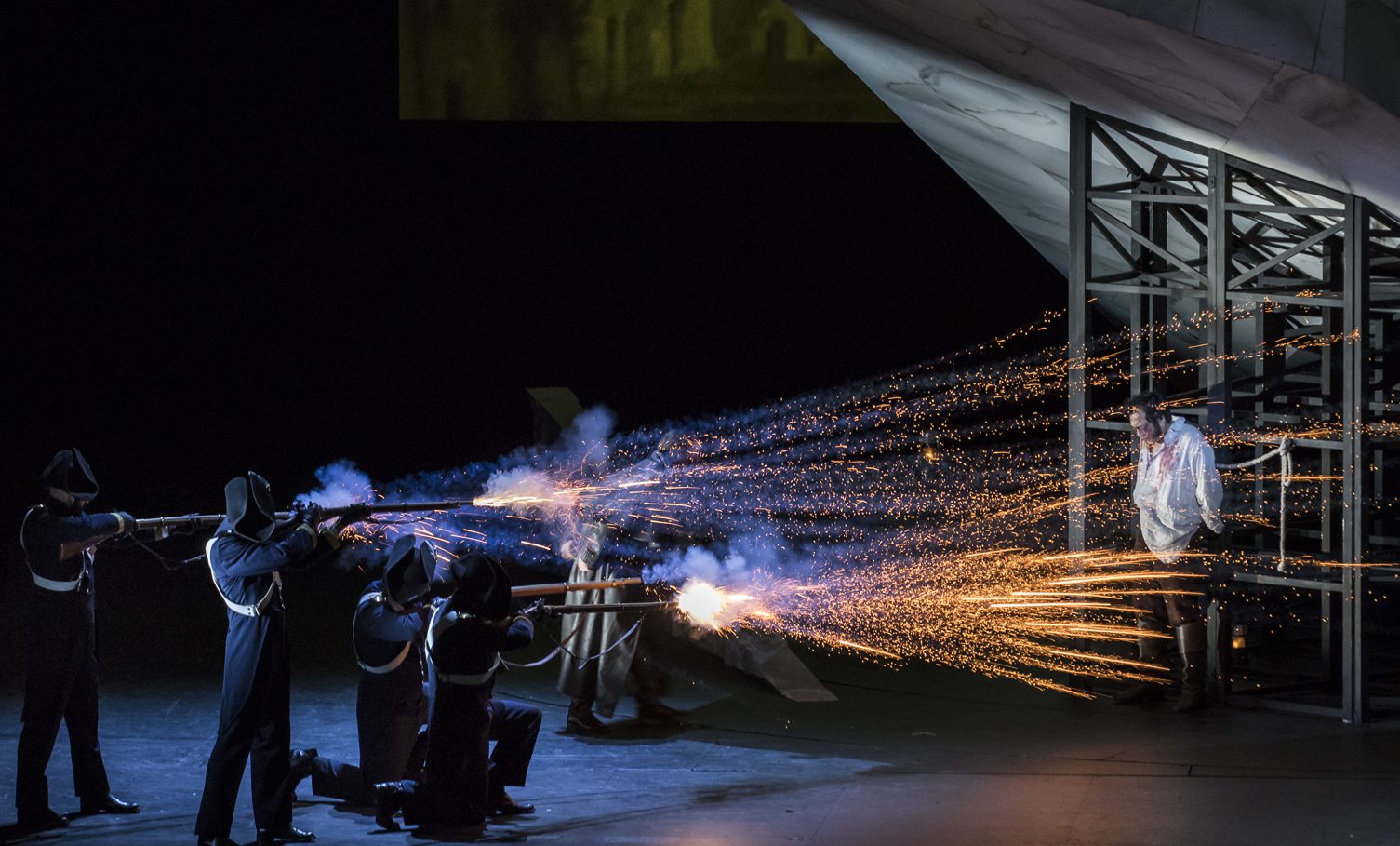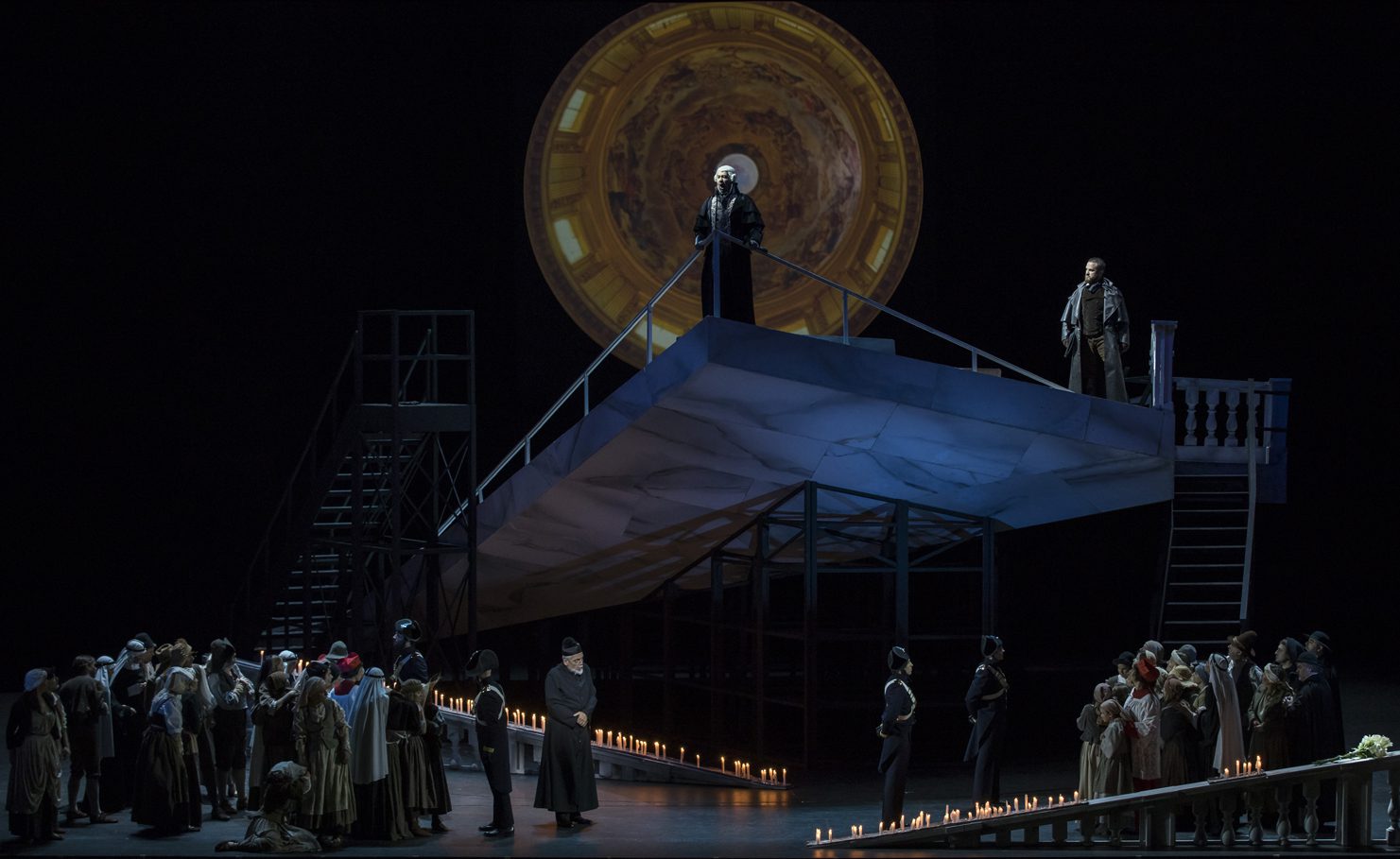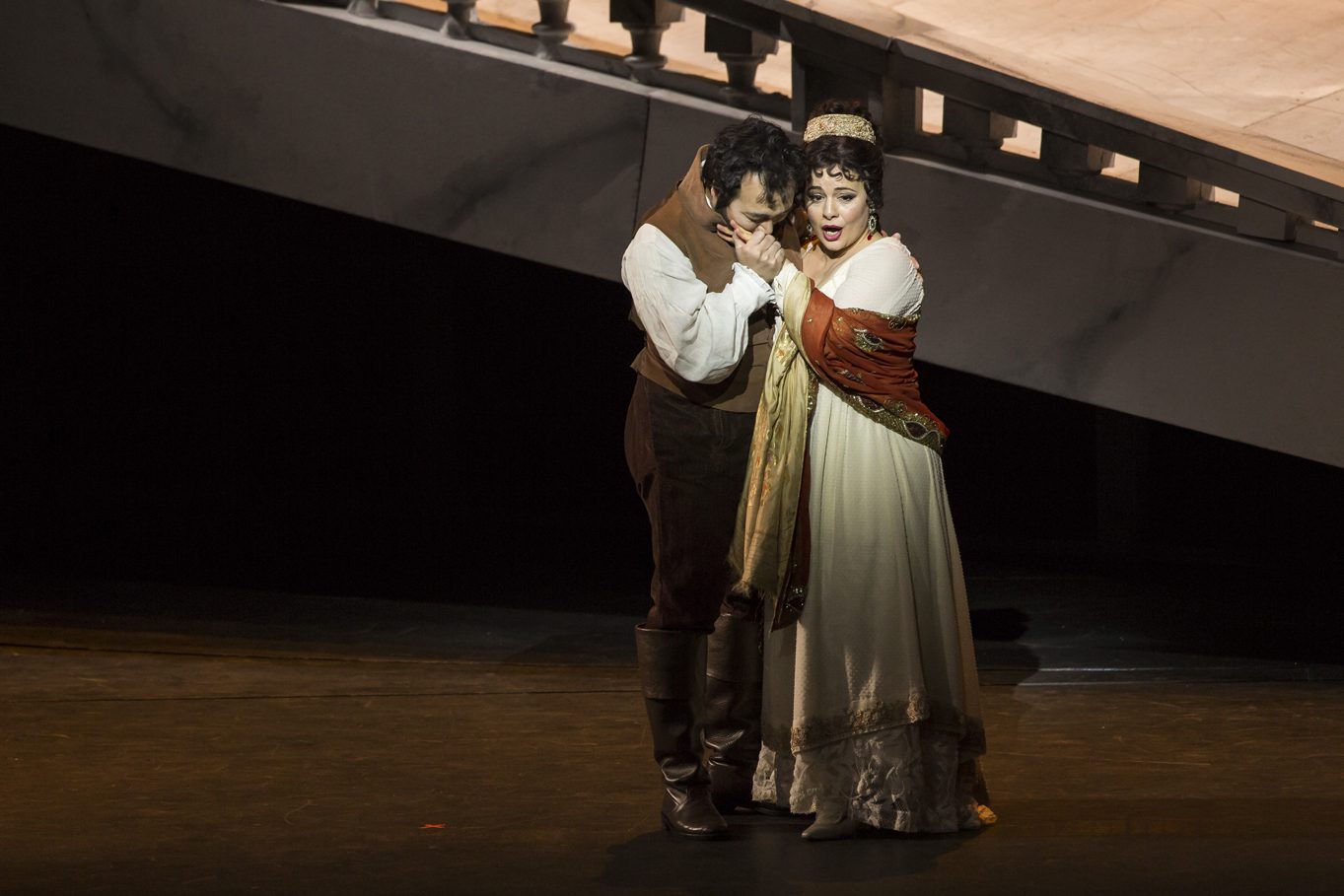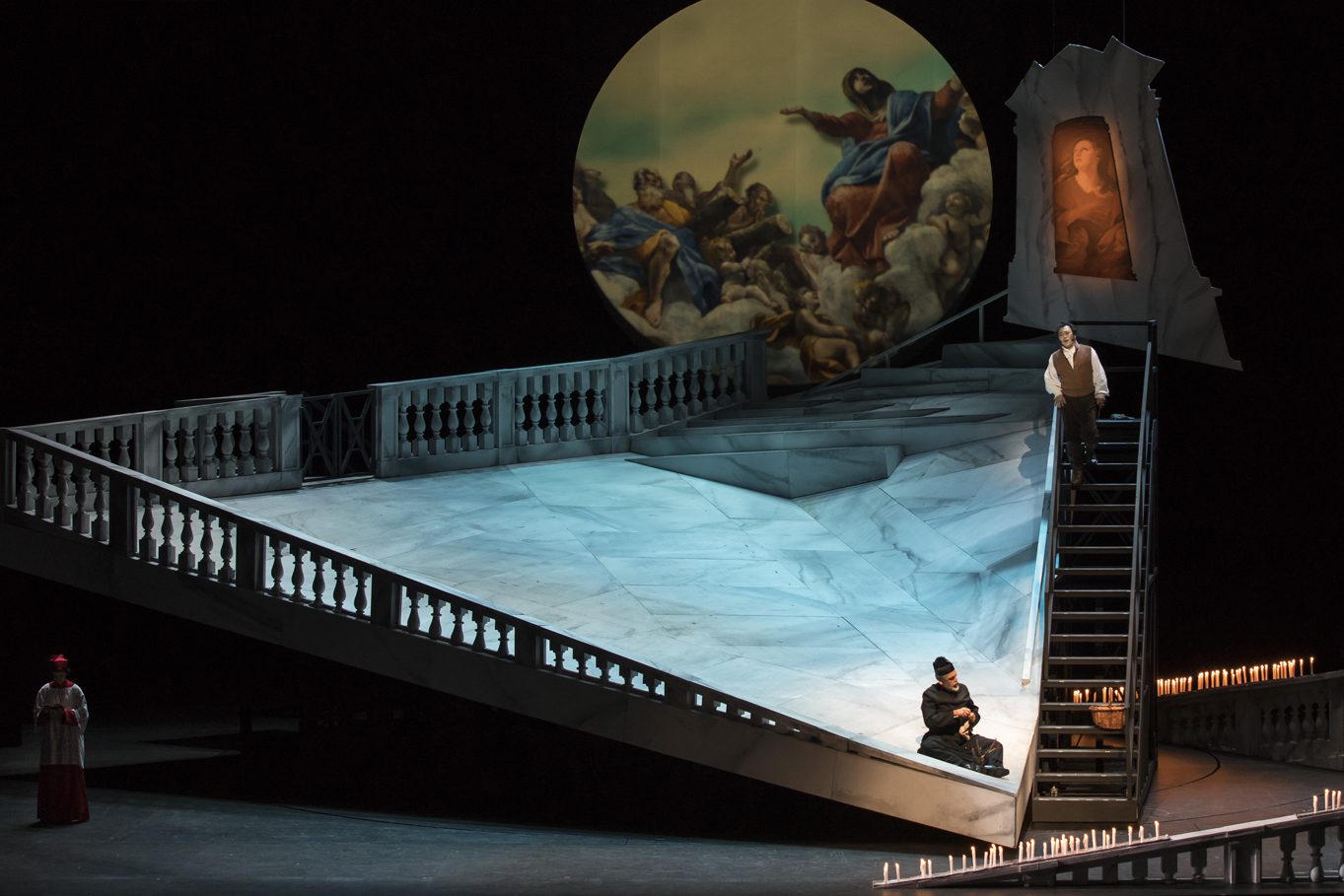Conductor
Nicola Luisotti
Stage Director, Set Designer and Lighting Designer
Davide Livermore
Costume Designer
Gianluca Falaschi
Production
Teatro Carlo Felice, Genoa
Escola Coral Veus Juntes de Quart de Poblet
Roser Gabaldó, Míriam Puchades, chorus masters
Cor de la Generalitat
Francesc Perales, director
Orquestra de la Comunitat Valenciana
Tosca
Lianna Haroutounian
Cavaradossi
Alfred Kim
Scarpia
Claudio Sgura (6, 12, 18)
Gevorg Hakobyan (9, 15, 21)
Cesare Angelotti
Alejandro López
Spoletta
Moisés Marín *
Sciarrone
César Méndez *
Sagrestano
Alfonso Antoniozzi
Carceriere
Andrea Pellegrini *
Pastorello
Alejandro Navarro **
* Centre Plácido Domingo
** Escolania de la Mare de Déu dels Desemparats
ACT I
Year 1800. Sant’Andrea della Valle Church in Rome, Cesare Angelotti, Consul of the defunct Republic, has escaped from Sant’Angelo Castle where he was held prisoner under the evil tyrant Baron Scarpia. Exhausted, he manages to reach the church where he hides in the Attavanti family side chapel after managing to open the gate with the key his sister, the Marchioness of Attavanti, had left for him in a hiding place.
The Sacristan approaches, who thinks he has heard somebody inside the church. He was expecting to find the painter Mario Cavaradossi, but he only finds a hamper with the artist’s appetising lunch. He starts to get the paint brushes ready while praying the Angelus. Mario arrives, who immediately climbs the scaffolding and uncovers the picture of Mary Magdalene he is painting. The Sacristan, when he sees it, notices a similarity between the face on the canvas and that of a devout woman who regularly comes to the church to pray (the Marchioness of Attavanti).
Cavaradossi is left alone, engrossed in his work. Angelotti, now sure there is nobody else in the church, leaves the side chapel. He is surprised by the painter, who recognises him and promises to help him. But first he has to return to his hiding place, because they hear the church door opening and the voice of the famous singer Floria Tosca, the painter’s girlfriend, who claims his attention incessantly. She asks him why the door to the church was closed, and who he was talking to. Mario calms her down and says that he is alone. Tosca suggests they spend the night together at the painter’s house, after her performance.
While the artist is working on the painting, his loved one cannot keep her eyes of the portrait hosting a certain degree of curiosity and concern, until she recognises the blue eyes of the Marchioness of Attavanti in the painting. Mario assures her she has no need to be jealous, and confesses that the painting is inspired on her by chance, since he sees her pray so devoutly every morning.
Once Tosca leaves, Mario suggests Angelotti hides in his country house and, in case of danger, to hide in the well in the garden. In order to help the fugitive escape, his sister has left some woman’s clothes in the chapel and a fan, for him to disguise himself. Mario says that it will not be necessary because the road to his house is always deserted at night. Suddenly the cannons of Sant’Angelo Castle boom out, warning of the escaped prisoner. There is no time to lose. Cavaradossi decides to leave with him and guide him to his house.
The Sacristan returns and is very anxious while reporting that Bonaparte has been defeated. The choir make preparations to celebrate the victory with a thanksgiving service. With the bursting in of Scarpia, head of the police, the air of jubilation is brought to an end. The Baron does not understand why there is such a commotion in the church. Accompanied by the police officer Spoletta and his henchmen, the investigation begins. Everything points to Angelotti hiding there: the gate of the Attavanti family chapel is ajar and the food hamper of the painter is there, empty, as well as a fan with the Attavanti coat of arms on it. The shrewd Scarpia also observes that the face on the painting bears a likeness to that of the Marchioness, which would appear to involve its author in the prisoner’s escape.
Tosca comes in looking for Mario. The Sacristan says that he has fled. The woman is confused. Scarpia takes advantage of the situation to relight the embers of the temperamental singer’s jealousy. He politely greets her and mentions that the Marchioness’s fan was found on the painter’s scaffolding, therefore making Tosca believe that the alleged “lovers” (Mario and the Marchioness, portrayed in the painting) had been chanced upon by someone and had fled. Tosca, livid with anger, suggests going to the painter’s house to surprise them. Scarpia orders Spoletta and his hired assassins to follow her. Meanwhile, the Baron is revelling in his lustful thoughts for Tosca. The thanksgiving service begins.
ACT II
Farnese Palace at dusk. Scarpia has dinner while worrying. Through the window he can hear the cantata Tosca is singing at the party organised in honour of General Melas for his victory over Napoleon. The Baron has ordered Tosca to be brought before him when the ceremony is over. Scarpia is burning with desire to hold the singer in his arms and he will do whatever it takes to achieve it. The most effective method to obtain his goal is to use Mario, since, because of her love for him, Tosca will do anything.
Spoletta interrupts the dinner to report back to the Baron about Tosca being followed. She inadvertently led them to Cavaradossi’s house in the country, but they found no sign of Angelotti there. Not wanting to come before Scarpia empty-handed, Spoletta has arrested Mario and brought him before the Baron to be interrogated as a suspect. The painter denies all accusations by Scarpia and refuses to confess.
Tosca arrives extremely agitated. Mario quietly begs her not to say anything or he will be a dead man. The painter is taken to the dungeons. Scarpia sits in front of Floria ready to talk and asks her to tell him the whereabouts of the fugitive. She says she has no idea what he is talking about. The Baron then orders his henchmen to start torturing Cavaradossi. At first Tosca holds out until she can no longer bear the cries of pain coming from her loved one that rise up from the underground dungeons, and reveals Angelotti’s hiding place to Scarpia. She asks to see Mario. When he is brought to her, barely conscious from the pain of his injuries, she is horrified. He, barely able to talk, curses her for having given him away.
Sciarrone, a gendarme, enters all of a sudden with the news that General Melas has been defeated by Bonaparte in Marengo, contrary to what had been reported earlier. Cavaradossi, finding strength from deep down, cries out “victory”, for their freedom against the tyrants, which throws Scarpia into a rage and orders the assassins to take him away and execute him.
The Baron is now ready to carry on with his diner. He invites Tosca to sit down and have a glass of wine. She decisively asks how much it will cost to free Mario. But Scarpia’s objectives have nothing to do with money, they are carnal desires: he wants to possess Tosca, even though it is only for one night. The singer is sickened by the lecherous desires of the Baron. He tries to put his arms around her and she moves away shocked.
There is a knock at the door. It is Spoletta who says that Angelotti has been found but committed suicide before he could be arrested. Scarpia orders his body to be hung next to Cavaradossi’s on the gallows. Then, Tosca, overcome by the turn of events accepts his indecent proposal. As a condition she says that Mario must be freed immediately. The Baron uses the excuse that he cannot be given a public pardon, and explains that it would be best to enact a mock execution by firing squad. That is what he tells his trusty servant Spoletta, in the presence of Tosca, so that he can make everything ready. She agrees, but demands to be allowed to go to the execution to tell her loved one of the plan, and also asks for a safe conduct order so that they can both leave the country.
While Scarpia is writing and signing the document, Tosca finds a knife on the table and hides it behind her back. When the Baron approaches her to embrace her, she surprises him by stabbing him in the chest. The evil Scarpia bleeds to death. The singer, true to her religious beliefs, places two candles around the dead body and a crucifix on his chest. After finding the safe conduct order in one of the hands of the dead body, she rushes to leave the palace.
ACTO III
Sant’Angelo Castle Terrace at dawn. Mario will be executed before a firing squad within the hour. He asks the jailer for one last wish, to write some words to Tosca. The jailer agrees, after being given a ring in exchange. Cavaradossi thinks a while before breaking down in tears. Tosca arrives and shows him the safe conduct order allowing them to go free. She tells him everything that has happened and how she killed the tyrant with her own hands.
The firing squad approaches. Spoletta gives the order to fire. Tosca, who has already explained to Mario that it is only a mock execution, suggests he falls to the ground after the first shot and to lie still until she comes to him. The soldiers open fire. Cavaradossi falls to the ground. When Tosca is sure that everyone else has left, she walks across to tell him that they can go. But to her horror she discovers that Mario is dead. Scarpia’s henchmen have discovered the Baron’s body, and are trying to arrest her. Tosca, after vehemently shouting the words “Scarpia, I’ll see you before God” throws herself into the void.
© Miguel Lorenzo
